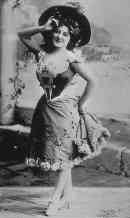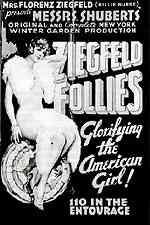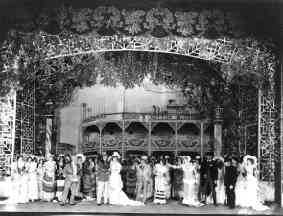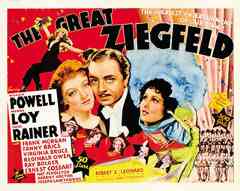|
|
|
 |
|
Florenz ZiegfeldImpresario Extraordinaire | |
|
Florenz (Flo) Ziegfeld, Jr. was a legend in his own time who has often been called Broadway's greatest showman. He was a theater manager and producer who is best known for the musical Show Boat and the long running Ziegfeld Follies revue. Ziegfeld's business card read "Impresario Extraordinaire" and that wasn't an exaggeration. Every one of his shows were opulent events, featuring beautiful women, chic costumes and elaborate sets. Flo was born in Chicago in 1869, into a well-to-do family. His father was a German immigrant who owned the very successful College of Music in Chicago. Flo first displayed his talent for promotion as a child when he sold tickets to the neighborhood kids to see his school of "invisible fish" which turned out to be nothing more than a glass bowl filled with water. |
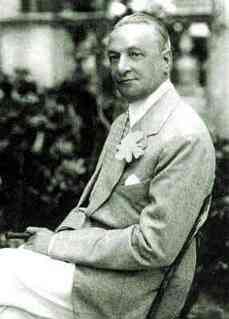 |
Flo's father opened a nightclub called The Trocadero in 1893. The club wasn't doing very well till Flo offered to manage the talent. His first show biz success came when he booked 23 year old strongman Eugene "The Great" Sandow. Flo created quite a stir and a lot of favorable press coverage after he invited several ladies from the audience backstage to examine Sandow's extraordinary physique. The Trocadero was soon the most popular club in town and Ziegfeld later took Sandow on tour throughout the United States. Ziegfeld went to Europe to scout for new talent and while in London he met a beautiful cafe singer named Anna Held. Anna had a sexy French accent and a fantastic figure, and Ziegfeld was so enchanted by her that he married her. He planned to bring her back to America and serve as her manager but Anna suggested to him that he should create a show like the famous Folies-Bergere of Paris; a variety show with lots of scantily clad women. Anna said, "Your American girls are so beautiful, the most beautiful girls in the world. If you dress them up chic, you'd have a better show than the Folies-Bergere."
Ziegfeld's shows emphasized glamour and beauty. Flo called himself the "glorifier of the American girl" and he had a great talent for finding beautiful and talented women. He auditioned girls for his shows by first watching them walk in high heels. "Before I see their faces, I want to see how they walk. There's more sex in a walk than in a face or even in a figure."
His "Ziegfeld girls" were soon regarded as the standard of
beauty. And no wonder, since they always appeared in scanty costumes and
were sometimes partially or completely nude. His most famous nude
performer was Josephine Baker and like Baker, many of his girls went on
to become film stars.
In the Follies of 1910, Ziegfeld took a big chance in alienating his white audience by featuring Bert Williams; making him the first black man to co-star on Broadway with white performers. Other stars who got their start or were featured with the Ziegfeld follies included, Sophie Tucker, Fannie Brice, Eddie Cantor, Ruth Etting, Will Rogers, Marilyn Miller, W.C. Fields, Marion Davies, Enrico Caruso, and Ed Wynn. Ziegfeld was flamboyant, a big spender and a womanizer. His constant dalliances with showgirls finally led to his divorce from Anna in 1912. He met actress Billie Burke (who later played the good witch "Glenda" in the 1939 film Wizard of Oz) and married her in 1914. Ziegfeld also produced nightclub shows. One of his most famous shows included a glass walkway, so that chorus girls could dance right over the audience's heads. He thoughtfully provided little wooden hammers so that the audience could bang out their approval and not hurt their hands from clapping so much. In the 1920's he began producing some very successful musical comedies such as; Sally, Rio Rita, The Three Musketeers, Rosalie, Whoopee, Kid Boots, and Show Boat. Show Boat, which opened in 1927, was one of the most popular musicals ever. The story spans almost 50 years and was based on Edna Ferber's sprawling novel of life on the Mississippi. The music was written by Jerome Kern and Oscar Hammerstein, and included many hits like Make Believe, You are Love, Bill and Old Man River. The story is about the inhabitants of a Mississippi showboat from the 1880's to the 1920's. It was an incredibly brave venture, because the show had a multiracial cast and dealt with subjects that had been taboo on Broadway, such as racism, miscegenation and broken marriages.
Meanwhile he was also suffering from a recurring lung infection that had progressed from pneumonia to pleurisy. His health was failing, and he knew he didn't have much time left. Flo spent the last few months of his life attempting to suppress his fear of death by hosting an endless stream of gin-soaked orgies.
|
|

